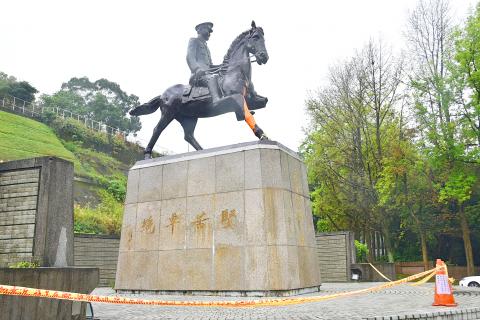National Chengchi University (NCCU) yesterday said that it would demand compensation from National Taiwan University student Hsu Che-jung (許哲榮) and his accomplices for vandalizing a statue of Chiang Kai-shek (蔣介石) on its campus.
The statue of Chiang sitting on a horse is near the rear exit of the university.
Hsu and his accomplices early yesterday morning allegedly severed one of the horse’s legs.

Photo: Wu Po-hsuan, Taipei Times
It was an attempt to remove all symbols of authoritarianism from NCCU’s campus, Hsu said.
Thursday next week is 228 Peace Memorial Day, but the university has yet to take responsibility for the role it played during the White Terror era, he said.
Everyone in the system, including the military and police, were Chiang’s accomplices, propping up his “dictatorship,” Hsu said, adding that he targeted the statue because he considered the horse to be representative of those who helped Chiang.
“By our actions, we hope to dissolve the authoritarianism of the Chiang era from its roots and encourage Taiwanese to face their history ... while increasing the chance of dialogue,” Hsu said.
The university’s decision to seek compensation was the “worst choice” during this period of transitional justice, he said.
“The dictator created many symbols so that his status of authority could live on,” Hsu said, adding that he was sorry there are still people who defend authoritarian rule.
NCCU welcomes democratic and varied ways of expressing opinions, but would press charges against those responsible and demand compensation, university secretary-general Ho Lai-chieh (何賴傑) said.
Freedom of expression is a constitutionally guaranteed right, but NCCU does not condone violence as a form of expression, Ho said.
NCCU had previously discussed the issue and decided to preserve the statue, Ho said, adding that it has no immediate plans to change that decision.
Student groups from the two universities, as well as other youth groups, said that more attention should be paid to transitional justice, while calling for a free and independent Taiwan.
Students should act to remove the remaining vestiges of authoritarian rule and reinforce Taiwan’s democracy, the groups said.
Separately, the Transitional Justice Commission said that while it understood young people’s opinions and actions, it was nonetheless sorry to hear of Hsu’s actions.
The commission said that it encouraged faculty and students to resolve their differences through the democratic channels available at NCCU.
Additional reporting by Lee Hsin-fang

‘TAIWAN-FRIENDLY’: The last time the Web site fact sheet removed the lines on the US not supporting Taiwanese independence was during the Biden administration in 2022 The US Department of State has removed a statement on its Web site that it does not support Taiwanese independence, among changes that the Taiwanese government praised yesterday as supporting Taiwan. The Taiwan-US relations fact sheet, produced by the department’s Bureau of East Asian and Pacific Affairs, previously stated that the US opposes “any unilateral changes to the status quo from either side; we do not support Taiwan independence; and we expect cross-strait differences to be resolved by peaceful means.” In the updated version published on Thursday, the line stating that the US does not support Taiwanese independence had been removed. The updated

‘CORRECT IDENTIFICATION’: Beginning in May, Taiwanese married to Japanese can register their home country as Taiwan in their spouse’s family record, ‘Nikkei Asia’ said The government yesterday thanked Japan for revising rules that would allow Taiwanese nationals married to Japanese citizens to list their home country as “Taiwan” in the official family record database. At present, Taiwanese have to select “China.” Minister of Foreign Affairs Lin Chia-lung (林佳龍) said the new rule, set to be implemented in May, would now “correctly” identify Taiwanese in Japan and help protect their rights, the Ministry of Foreign Affairs said in a statement. The statement was released after Nikkei Asia reported the new policy earlier yesterday. The name and nationality of a non-Japanese person marrying a Japanese national is added to the

AT RISK: The council reiterated that people should seriously consider the necessity of visiting China, after Beijing passed 22 guidelines to punish ‘die-hard’ separatists The Mainland Affairs Council (MAC) has since Jan. 1 last year received 65 petitions regarding Taiwanese who were interrogated or detained in China, MAC Minister Chiu Chui-cheng (邱垂正) said yesterday. Fifty-two either went missing or had their personal freedoms restricted, with some put in criminal detention, while 13 were interrogated and temporarily detained, he said in a radio interview. On June 21 last year, China announced 22 guidelines to punish “die-hard Taiwanese independence separatists,” allowing Chinese courts to try people in absentia. The guidelines are uncivilized and inhumane, allowing Beijing to seize assets and issue the death penalty, with no regard for potential

‘UNITED FRONT’ FRONTS: Barring contact with Huaqiao and Jinan universities is needed to stop China targeting Taiwanese students, the education minister said Taiwan has blacklisted two Chinese universities from conducting academic exchange programs in the nation after reports that the institutes are arms of Beijing’s United Front Work Department, Minister of Education Cheng Ying-yao (鄭英耀) said in an exclusive interview with the Chinese-language Liberty Times (the Taipei Times’ sister paper) published yesterday. China’s Huaqiao University in Xiamen and Quanzhou, as well as Jinan University in Guangzhou, which have 600 and 1,500 Taiwanese on their rolls respectively, are under direct control of the Chinese government’s political warfare branch, Cheng said, citing reports by national security officials. A comprehensive ban on Taiwanese institutions collaborating or